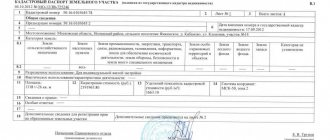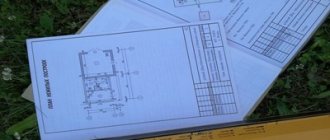Home / Housing disputes / Privatization of a house with land
Private houses, cottages and dachas are among the most popular types of real estate in Russia. If their owner is a citizen, then he can freely dispose of his property. And, on the contrary, if the house belongs to the municipality or the state, then this right for citizens is limited. True, there is an option to privatize an object with a land plot. This can be done completely free of charge using a simplified procedure.
How does home privatization happen and why do ordinary citizens need it? We will try to provide answers to the most pressing housing questions in our material.
✅ What is home privatization?
First, let's understand the terminology.
House privatization is a legal procedure for transferring state (municipal) property into private hands. The second name for privatization is denationalization. The process affects real estate in the form of residential buildings, non-residential properties, land plots and even entire enterprises. We are interested in the privatization of the house and the plot allocated for it.
The regulations are enshrined in Federal Law No. 178 “On Privatization...” dated December 21, 2001. Everything related to the transfer of rights to residential properties is noted in Federal Law No. 1541-1 of July 4, 1991. It was from this period that the go-ahead for free privatization of the housing stock was given in our country.
Despite the hype, not all residential properties have yet been privatized by Russian citizens. That is why the denationalization process is extended from year to year, and since 2021 it has become indefinite . Simply put, you can take your time with the privatization of your house and land, but leisurely collect all the documents and submit an application (see “Until what year has free privatization been extended?”).
✅ Is it possible, is it necessary and why to privatize a private house with a plot of land?
Lawyers regularly receive questions like: is it possible and necessary to privatize houses with land? Some citizens believe that it is better to leave the property on the balance sheet of the municipality. Allegedly, you won’t have to pay taxes and it’s generally more profitable to use housing. Is it really?
Privatization of a municipal house with land is available to all citizens of our country, free of charge and in a short time. Consequently, anyone can register the transfer of ownership from the municipality to private hands. The restrictions are minimal, we will talk about them in the following sections.
Is it necessary to privatize a house with land? Everyone decides for themselves. But in most cases, privatization is more profitable than using the property under a social lease agreement.
Benefits of transferring to private ownership:
- increase the market value of housing;
- dispose of the house at your own discretion and without regard to the state;
- exchange, merge, divide a plot;
- build several buildings (for comparison, the state allows tenants to have only one building in addition to the house);
- claim compensation in the event of seizure of a site for municipal needs.
Thus, the main goal of privatization is to allow citizens to own residential premises. A benefit for the state can be considered a replenishment of the tax base. The property of individuals is subject to taxation (Article 401 of the Tax Code of the Russian Federation). Thus, the authorities control the use of property within the country.
Is it necessary to do this?
Registration of the site where the property is located is not a mandatory procedure.
Residents can only privatize the house, and the municipality or state will remain the owner of the land. Among the advantages of this solution is that you will not need to pay property taxes. The disadvantages include the fact that it will not be possible to make transactions with real estate that require registration steps.
The owner will not be able to erect outbuildings on the site, as they will be considered “self-construction”.
✅ Terms
Simplified free privatization of house and land consists of several factors.
Let us highlight the main conditions:
- The citizen or members of his family have not previously participated in the privatization of housing - adults are given the right to one-time privatization, and children under 18 years old again upon reaching adulthood.
- A residential building with a plot of land is provided to a citizen on the basis of the lack of alternative housing. If the property already has privatized housing, they won’t give you a new one, which means you won’t be able to register it.
- The procedure is consistent with all persons registered in the house. If family members refuse, the document must be certified by a notary.
- Privatization is aimed at different lands - individual housing construction, private household plots, SNT, DNT and others.
- The land area has not been withdrawn from circulation and does not belong to the environmental protection zone.
Expert opinion
Semyon Frolov
Lawyer. 7 years of experience. Specialization: family, inheritance, housing law.
Previously, it was necessary to determine the status of a privatized house - a full-fledged residential property or a summer cottage. In the second case, the house could not be classified as housing; the authorities prohibited registration in it. It was believed that dachas were intended only for summer seasonal recreation. However, as of January 1, 2021, the concept of “dacha” has been abolished. Instead, the concept of “garden houses” applies. They can be considered residential, provided that the object meets the requirements of a capital building. Gardeners have the opportunity to obtain permanent registration in such houses. Read more about this in the article “Is a garden house a residential or non-residential premises?”
When they can refuse
A citizen of the Russian Federation may be refused privatization of housing for the following reasons:
- if he lives in the house illegally;
- the house has a debt on utility bills;
- illegal redevelopment has been carried out in the house;
- housing has a special social status (dormitory, office housing, etc.);
- the building is in disrepair;
- the land plot under the house is located in a nature protection zone or has been withdrawn from circulation.
In any case, the refusal must be official and have a specific justification.
✅ How to privatize a residential building and land?
The applicant must decide how privatization will take place. Considering that the house is located on land, the plot is also subject to privatization. There is a second option - to denationalize only the residential property.
When transferring municipal real estate, you need to contact the land use department , and in the case of federal property - to the territorial branch of the Federal Property Management Agency . Now this can be done through the “My Documents” (MFC) offices.








